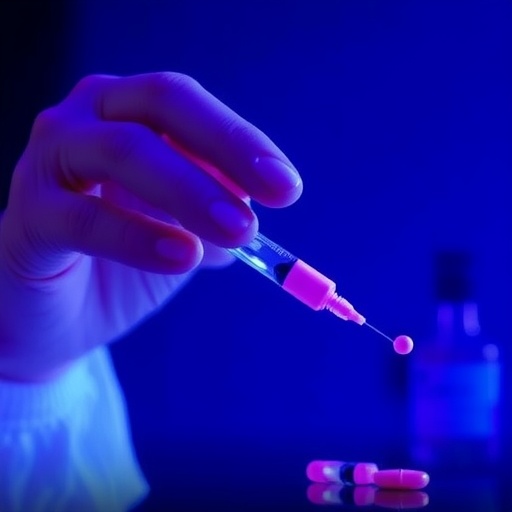Researchers at the University of Bath have achieved a significant breakthrough that could revolutionize the way therapeutic proteins are administered, potentially eliminating the discomfort and inconvenience of injections for millions of patients worldwide. This innovative technology enables the oral delivery of protein-based drugs, such as hormones, antibodies, and peptides, which traditionally require injection due to their vulnerability to degradation in the digestive tract. By harnessing a natural bacterial transport mechanism, the system efficiently carries these delicate molecules across the intestinal barrier and into the bloodstream, opening the door to a new era of non-invasive medication.
Proteins, especially therapeutic ones like human growth hormone or monoclonal antibodies, cannot be given orally in their current form because they are broken down by gastric acids and enzymes in the stomach and intestines. This intrinsic limitation has confined many lifesaving treatments to injectable formats, posing challenges such as pain, risk of infection, and patient non-compliance due to needle aversion or the inconvenience of self-administration. These drawbacks are particularly problematic for chronic conditions that necessitate frequent dosing, including diabetes and various cancers.
The novel system, developed under the guidance of Professor Randy Mrsny from the Department of Life Sciences at the University of Bath, takes inspiration from the gut microbiome—specifically, bacteria that naturally manipulate host epithelial cells to transit substances across the intestinal lining. By conjugating therapeutic proteins to a non-toxic carrier molecule derived from cholera-associated bacteria, the researchers successfully exploit a highly specific receptor-mediated pathway. This carrier binds to receptors on intestinal epithelial cells and triggers a transport process known as transcytosis, which ferries the drug intact across the gut wall without compromising the protective epithelial barrier.
.adsslot_Zc5XA12tyC{width:728px !important;height:90px !important;}
@media(max-width:1199px){ .adsslot_Zc5XA12tyC{width:468px !important;height:60px !important;}
}
@media(max-width:767px){ .adsslot_Zc5XA12tyC{width:320px !important;height:50px !important;}
}
ADVERTISEMENT
Animal studies have been pivotal in demonstrating the efficacy of this platform. In rat models, the researchers showed that proteins linked to the bacterial carrier could be absorbed into systemic circulation after oral administration. These promising preclinical results have already attracted interest from pharmaceutical companies eager to optimize the technology further and pursue clinical trials. The timeline for human testing is projected within two years, signaling a rapid transition from bench to bedside.
Professor Mrsny emphasizes that the mechanistic insight underlying this approach derives directly from human intestinal biology, lending confidence to its translational potential. The use of a well-characterized receptor and transcytosis route means the delivery mechanism can be generalized across various therapeutic proteins. This versatility could transform treatments for a broad spectrum of diseases that currently rely on injections, including growth hormone deficiencies, immunotherapies for cancer, and cutting-edge metabolic drugs like Wegovy and Ozempic.
The design of the carrier molecule is a cornerstone of the technology’s success. Derived from a domain of the cholix toxin, the human Fc CH2 domain modifies this pathway to enhance transcytosis efficiency without pathogenic effects. This clever bioengineering leverages evolutionary adaptations of bacteria while stripping away their toxicity, resulting in a safe and effective drug delivery vector that capitalizes on established intestinal transport machinery.
As the research progresses toward human applications, collaboration with pharmaceutical partners will be essential for formulation development, dosage optimization, and regulatory approvals. The compatibility of this delivery system with existing protein therapeutics could accelerate its integration into the pharmaceutical landscape, potentially sparking a paradigm shift in how injectable drugs are formulated, prescribed, and administered globally.
Moreover, the implications extend beyond patient comfort. Oral delivery could improve drug stability, storage, and distribution logistics by removing the need for syringes or refrigeration-dependent injection devices. This could enhance access to life-saving treatments in resource-limited settings or remote areas where medical infrastructure and trained personnel are scarce.
This advancement is anchored in rigorous experimental research, published in the Journal of Controlled Release, with significant support from industry leaders such as Novo Nordisk. The foundational work represents a blend of microbiology, protein engineering, pharmacology, and clinical science, showcasing the interdisciplinary nature of modern therapeutic innovation. It exemplifies how understanding host-pathogen interactions at the molecular level can inspire groundbreaking solutions to long-standing medical challenges.
In conclusion, the University of Bath’s oral protein delivery platform marks a transformative milestone that could reshape pharmaceutical treatment paradigms. By effectively mimicking a natural bacterial transcytosis pathway, it overcomes formidable barriers in protein drug administration. If successfully translated into clinical use, this technology promises to improve patient adherence, quality of life, and therapeutic outcomes across a multitude of conditions traditionally managed with injections.
Subject of Research: Animals
Article Title: Human Fc CH2 domain modifies cholix transcytosis pathway to facilitate efficient oral therapeutic protein delivery
News Publication Date: 17-Jun-2025
Web References: http://dx.doi.org/10.1016/j.jconrel.2025.113964
References: Journal of Controlled Release, University of Bath study led by Professor Randy Mrsny
Image Credits: University of Bath
Keywords: Drug delivery, Drug delivery systems, Routes of administration, Pharmaceuticals, Medications
Tags: advancements in protein drug deliverybacterial transport mechanisms in medicinechallenges of injectable medicationsfuture of injectable drug alternativesinnovative drug delivery systemsnon-invasive medication innovationsoral administration of monoclonal antibodiesoral delivery of therapeutic proteinspatient compliance in chronic disease treatmentreplacing injections with pillstherapeutic proteins and digestive degradationUniversity of Bath research breakthroughs





